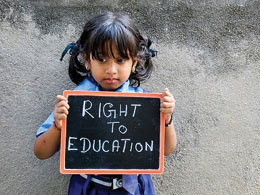Lack of education is a fundamental problem, it marginalizes the people, forcing them to live in depravity. The poor are desperate to move out of depravity, they don’t have much of a choice as such when they decide to walk the criminal path. This becomes evident when one takes a look at the
prison statistics provided by National Crime Records Bureau of India for the year 2015, which states that nearly 27% of the convicts are illiterate and 42% of the convicts have studied up till 10th class. While According to the report by Annual Survey of Education Report, a substantial number of students’ up till class 8th in government schools are devoid of skills expected of an average 2nd class child. Further, the
infrastructural state and poor qualification of the school teachers is also highly worrisome. 40% of the schools were without electricity and 31% of the teachers not being graduates. All this creates a predicament for the socio-economically deprived groups, who can’t afford a private school to educate their child. While some children get involved in menial labor in order to earn a living, many of them get entrapped within the criminal world as the prison statistics show.
Despite of this the government continues to hold back on financing the education sector in the country, back in 1960s Kothari education commission had suggested that budget allocation for education should be 6%, but even now the budget allocation is just 3.8%, despite the promise made by the government to bring it up to 6%. Along with this right to education (RTE) a fundamental right as provided under Article 21-A of the Constitution of India has not been implemented effectively, presently only 9.5% of the schools being RTE compliant. RTE itself is not completely inclusive in nature, considering the fact that it provides only for children aged between 6-14 leaving the older children to fend for their own. Considering the current employment status, with forty percent of the people being unable to find a full-time job, where even post-graduates are finding it difficult to get a job it seems unfair to take away state-support when the child turns 14.
Children can be easily influenced, making it highly important for them to have positive vibes around them, but the failing education system of India pushes them into working small jobs where they come across agents of exploitation who use them for illegal purposes as depicted quite explicitly in movies like
Salaam Bombay and
Slumdog Millionaire. It is the responsibility of the state that its people should be provided with adequate support so that they become
capable of leading a healthy life and it is the failure of the state if its people have to resort to criminal practices in order to survive. Thus, it becomes important that RTE should encompass all the children up to 18 years of age within its ambit. Although, presently this seems to be a far-fetched expectation, considering that substantial implementation has not been possible of the original program itself.
Lastly, it is important that the criminal justice system should make attempts to incorporate the nuances of the life of the downtrodden while deciding their case. Considering the fact that most of the acts are born out of a desperate push to survive, it is important that the accused should not be further tormented by being incarcerated. Attempts should be made to maintain adequate rehabilitation centers for such people so that they can get another shot at life. As stated by Prof. Upendra Baxi in his work The Crisis of Indian Legal System, it is important that law should enforce morality of survival by not penalizing the crime born out of destitution and impose a morality of duty and aspiration on the people who are resourceful to protect the underprivileged people.
Works Cited:-
2) TCA Sharad Raghavan, The poor state of school infrastructure
3) Ambarish Rai, Extreme neglect of primary education in budget 2017
4) Vivek Kaul, Book excerpt: The real story behind India’s low unemployment
5) Rukmini S, In India, unemployment rate still high
6) Roger Ebert, Salaam Bombay!
7) Roger Ebert, Slumdog Millionaire
http://www.rogerebert.com/reviews/slumdog-millionaire-2008#disqus_thread
8) Thomas Wells, Sen’s Capability Approach
About the Author:
Ananye Krishna is a third-year law student at NALSAR University of Law, Hyderabad. He has been engaged in teaching underprivileged students since his first year at the University, both independently and as a part of an NGO by the name of IDIA (Increasing Diversity by Increasing Awareness).






Leave a Reply